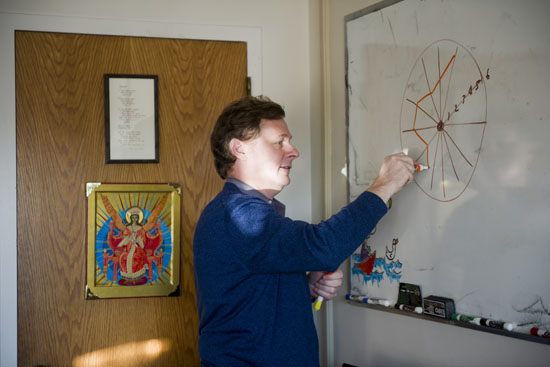Exploring the Spiritual Experience
STH project: women's and men's reactions to religious experiences differ

Men find religious experiences much more relaxing than women do. That preliminary finding of Wesley Wildman’s current research exemplifies the aspects of religion that have long intrigued the School of Theology professor of philosophy, theology, and ethics. Wildman, who studied math and physics in college, veered into the scientific study of religion out of fascination with another striking feature: the same religious beliefs that move some people to acts of awe-inspiring goodness compel others to commit hideous evil. His two-year research project will compare different people’s reactions to different religious experiences.
“What I really care about is moral formation,” says Wildman. “It’s the creation of interesting people with life goals who deploy religion and spirituality to help them achieve those life goals. This is regular people trying to be better husbands and wives, better parents to their kids, better neighbors, better coworkers. That’s one of the great and positive things about religion.” Yet, he notes, those same experiences tip some believers into extremism.
To catalogue religious experiences and their effects, Wildman and his fellow researchers have created ExploringMyReligion.org. The survey site asks participants to detail their religious or spiritual experience and then answer a battery of questions: Did it evoke positive and/or negative emotions? Vivid memories? A sense of the supernatural, or the immensity of the universe? Wildman is confident he’ll get at least the minimum 200 subjects needed for the research, from around the globe.
Wildman, director of BU’s doctoral program in religion and science and a cofounder of the Institute for the Bio-Cultural Study of Religion, applied his talent for science to the study of faith, he says, partly because of fond memories of his Methodist upbringing. He spoke with BU Today about his research.
BU Today: What religious faiths and experiences are you studying?
Wildman: Completely indiscriminate. We’re not interested just in people with identified religious traditions. There are people who wouldn’t think of themselves as religious, but have had these very intense experiences in terms of their moral orientation to the world. We did pilot work to test the methods we’re using in this project, and we had people reporting experiences when walking in the woods or walking into a deserted church or at a Shabbat meal or in meditation.
Why is it important to know how different religious experiences compare?
Some of them are quite dangerous. If you think about the convictions that people get from their experiences, they can lead to strange behavior, sometimes violent.
Everything from terrorism to snake handlers who get bitten?
Exactly. It would be good to get a handle on this extremely powerful phenomenon. But it’s also intrinsically interesting.
Wouldn’t the best way to study this be machines that monitor which parts of the brain are stimulated during prayer or meditation?
Our research group is also doing that, parallel to this project. But there are certain things you can’t get with that approach. You’ve got to deal with people’s narratives at some point to figure out what’s meaningful. How do you know what it is about the brain scans that are meaningful and interesting? The answer is, you listen to what people say they’re thinking about at the time.

Have you found any similarities or differences between religious experiences?
We have. This comes from pilot studies. As they remember the experience and answer questions about it, men experience positive emotion much more strongly than women do, and women experience negative emotion more strongly than men. They’re having strong positive experiences as well; it’s just more ambivalent. When you check muscular tension, for women, tension is high, for men, muscular tension is really low—they’re relaxed.
How do you explain that?
We think, for men, they’re normally primed, ready to protect, ready to fight. But these religious experiences are opportunities for them to relax. Their muscular tension drops, and the positive emotion goes up, negative emotion goes down. For women, these experiences are very often social things, so social circuitry kicks in. There’s this sense that in this experience, you’re going to have an encounter, and women, being so skilled in that area—their muscular tension goes up, and all of the complexities associated with potential social exchange get kicked in.
What we’re planning next is a test of this: do the survey and ask the statistics to tell us whether it was a man or woman who had the experience, and then ask blind raters to read narratives to detect whether it’s a man or woman. We’re predicting that the survey stats are going to be more accurate than human raters.
You can also tell the difference between someone with brain damage and someone without. Parkinson’s disease is the only thing we’ve studied in the pilot. The cognition, memory, emotion, everything is dull, dimmed. Which is terrible for these people. If you’re a religious person, everyone’s going to talk to you about the motor problems, the shakes, the inability to walk properly. But they’re not telling people about how their emotional and spiritual lives are affected.
What can be done about that?
There needs to be a transformation in the way people deal with patients. Some clinics are telling more of the story, but it’s very frightening for Parkinson’s people. It’s bad enough to have your body betray you, but to have your emotions go all dull? And their religious cognition dims. They don’t know why they believed that stuff, they can’t believe it any more or they can’t think about it with any conviction. It’s a major downer, because people want to rely on their religious faith to deal with a disease.

Comments & Discussion
Boston University moderates comments to facilitate an informed, substantive, civil conversation. Abusive, profane, self-promotional, misleading, incoherent or off-topic comments will be rejected. Moderators are staffed during regular business hours (EST) and can only accept comments written in English. Statistics or facts must include a citation or a link to the citation.